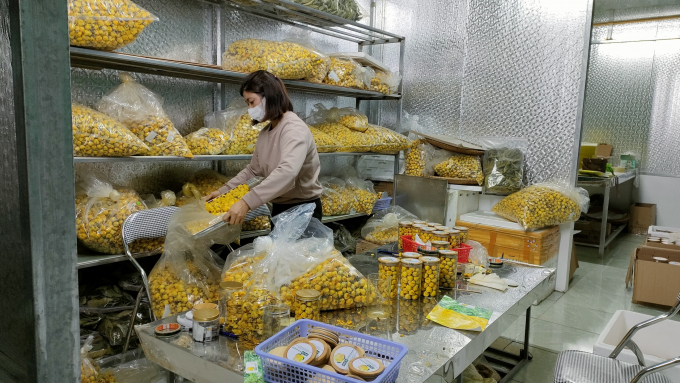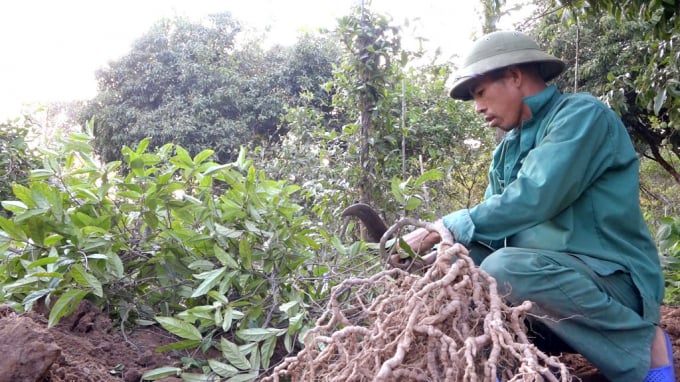May 21, 2025 | 13:22 GMT +7
May 21, 2025 | 13:22 GMT +7
Hotline: 0913.378.918
May 21, 2025 | 13:22 GMT +7
Hotline: 0913.378.918
In recent years, Quang Ninh province has restructured the forestry sector, aiming for sustainable forestry development with both socioeconomic and environmental benefits to be ensured.
The province has step by step transformed the growth model towards improving quality, efficiency and increasing competitiveness.

Camellia petelotii is a famous farming product of Quang Ninh.Photo: Nguyen Thanh.
In particular, the forestry sector has shifted from exploiting forests to taking advantage of available forest resources, increasing afforestation, forest protection and allocating land and forests to all economic sectors. The province created favorable conditions for people who live in forested areas and forest land to earn their living and increase incomes by running the forestry-relating business. Notably, the issuance of Resolution 19-NQ/TU dated November 28, 2019 by the Standing Board of the Provincial Party Committee on sustainable forestry development is a breakthrough, demonstrating the determination of the whole political system in forestry management, protection and development.
Quang Ninh has over 100,000 ha of natural forests, 200,000 ha of planted forests, 3 special-use forests, 6 protection forests, 8 forestry companies and 30 organisations that have been allocated or leased forests. With the diversity of natural and geographical conditions, the province has many potentials, advantages and space for economic development under the forest canopy.
Quang Ninh province has also accelerated the implementation of projects by non-State investors who have competent capital, technology, and production such as the project of growing fruit trees and medicinal herbs in combination with eco-tourism in Tien Yen and Binh Lieu Districts.
In addition, Quang Ninh province has promoted research related to economic development under the forest canopy. Accordingly, it determined scientific basis, investigated, conserved, propagated and built models of several tree species of economic value such as sand ginseng, ha thu o (Flowery knotweed), ba kich (Morinda officinalis), Camellia petelotii and Yen Tu yellow apricot. Localities in the province have focused on combining models of growing medicinal plants and short-term trees under the forest canopy, contributing to making the most of the forest land area and combating climate change and increasing income for local people.
To effectively implement the models, the whole province has reviewed forestry land areas being used for agroforestry production, completed the dossiers for the issuance of farm economic certificates, offer technical and legal supports to the local authorities and forest owners.
Quang Ninh has planned three key areas for the development of medicinal herbs associated with specific plant species. Up to now, the whole province has formed concentrated medicinal production areas.
Over the past time, localities have actively and effectively implemented economic models under the forest canopy, improving the value of forests and increasing incomes for people. Typically, like Ba Che district, with forestry land accounting for 91 per cent, the district targeted to become one of the green medicinal centers of Quang Ninh province and the Northeast region.

A man is harvesting ba kich (Morinda officinalis).
Vi Thanh Vinh, Head of Agriculture Department of Ba Che district, said that the district planned areas for growing medicinal plants, implementing the project on conservation and development of medicinal herbs in the district from 2021 to 2025. It expects to plant more than 100 ha of medicinal species yearly. Besides, the district built a model linking production, preservation, processing and consumption of medicinal herbs in the northern mountainous region in Thanh Lam commune. Morinda officinalis trees are planted under the canopy of acacia, guava and fruit trees with a yield of 5 tonnes per ha, generating an income of VND350 million per ha per year.
In communes of Dong Son, Dong Lam and Ky Thuong in Ha Long City, people chose taro trees to grow under the canopy of acacia trees, which are both suitable for the soil here and bring high economic value.
To improve the quality of taro, in 2016, the locality piloted a model of restoring upland taro varieties, increasing adaptability, the average yield is 5-6 tonnes per ha, and up to 10-12 tonne per ha of soil is good.
In addition, the city has also established a medicinal plant growing area with an area of more than 150 hectares, concentrated in the communes of Quang La, Bang Ca, Dong Lam, Dong Son, and Tan Dan.
To develop the economy under the forest canopy, in the coming time, Quang Ninh will promote research and application of biotechnology in the breeding and selection of forest plant varieties towards step-by-step improvement in yield and quality, quantity and type.
The province also prioritises attracting enterprises to build seed production facilities, large timber plantations in combination with economic development under the forest canopy. It is committed to supporting enterprises to get the certification of sustainable forest management. People are called for doing research, investing and expanding models of growing medicinal plants under the forest canopy, or combining animal husbandry to bring about high economic efficiency.
In the coming time, Quang Ninh province will also develop a type of eco-tourism based on the advantages of forests, thereby, improving people's incomes, promoting socio-economic development, and sustainable economic restructuring.
Translated by Hien Anh

(VAN) Facing the threat of rabies spreading to the community, Gia Lai province urgently carries out measures to vaccinate dogs and cats on a large scale.

(VAN) Disease-free livestock farming not only protects livestock herds but also stabilizes production and livelihoods for many farmers in Tuyen Quang.

(VAN) Japan's grant aid project contributes to capacity building, promoting organic agricultural production, and fostering sustainable community development in Dong Thap province.

(VAN) For years, the CRISPR-Cas9 genome technology has been reshaping genetic engineering, a precision tool to transform everything from agriculture to medicine.

(VAN) Vietnam aims to become a 'leader' in the region in the capacity and managing effectively soil health and crop nutrition.
![Reducing emissions from rice fields: [Part 1] Farming clean rice together](https://t.ex-cdn.com/nongnghiepmoitruong.vn/608w/files/news/2025/05/05/z6509661417740_a647202949c539012a959e841c03e1d3-nongnghiep-143611.jpg)
(VAN) Growing clean rice helps reduce environmental pollution while increasing income, allowing farmers to feel secure in production and remain committed to their fields for the long term.
/2025/05/19/5136-1-144800_230.jpg)
(VAN) The Nghe An Provincial People's Committee has just approved the list of beneficiaries eligible for revenue from the Emission Reductions Payment Agreement (ERPA) in the North Central region for the year 2025.